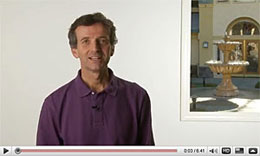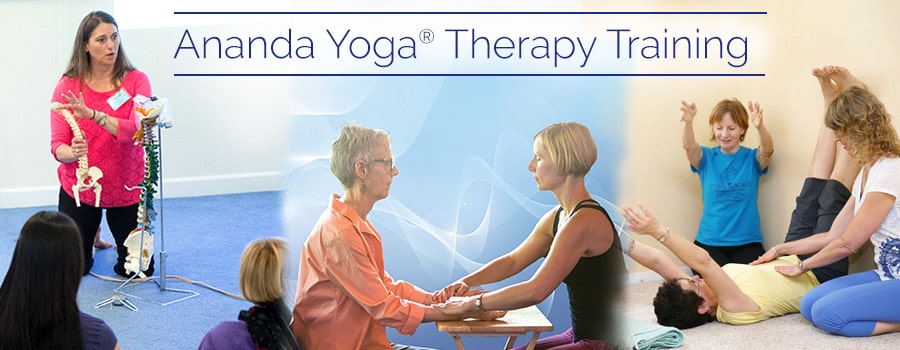SYLLABUS
Ananda Yoga® Therapy Training: Musculoskeletal–1
We are not currently accepting new students in the Ananda Yoga Therapy Training
Course Hours: Total = 107 (Residential and Distance)
- Residential: 73 (with 12 hours Practicum)
- Distance: 34 (as Home Practice)
- Practicum: 46 (12 Residential, 34 Distance)
Prerequisite
Enrollment in the Ananda Yoga® Therapy Training program, AND
*Ananda Yoga® Therapy Training: Principles
Teaching Format
This is a 12-day residential course, which combines lectures, discussion, practice teaching, case-study observation, experiential components, student talks and practicum. There are daily quizzes that are graded in class so both students and faculty know immediately exactly what may need to be reviewed or expanded upon. On the 5th day this course combines with a residential clinic/workshop. Yoga Therapy Students come to work with the Yoga Therapist Trainees under senior faculty observation. Students are matched with a yoga therapist trainee for three days of yoga therapy to include intake, private sessions, small group sessions, and take home program instruction. In between these sessions the yoga therapist trainees meet with their faculty to discuss their cases and plan a course of action and what has taken place already. Though this course focus is on musculoskeletal, other areas of study (such as Ayurveda, chakras, meditation, Bhagavad Gita, spiritual disposition and background, etc,) are brought into the discussion, instruction and practice. This is especially emphasized when working with the observed case studies and practicum component.
Course Description
Review of anatomy and physiology as it relates to the musculoskeletal system and yoga therapy is covered including common pathologies, structural imbalances, functional imbalances etc. Review and practice of intake especially as it relates to musculoskeletal issues, evaluation, decision-making and delivery of yoga therapy interventions.
For Musculoskeletal conditions, "Quick Fixes" (those protocols which work in the majority of cases), Level I Therapeutics (more in-depth) and Maintenance Therapeutics are covered. More severe conditions are discussed but yoga therapy interventions are not gone into in this course as they will be covered in more detail in Yoga Therapy Training: Musculoskeletal 2. Adaptations as needed for daily living are covered for different conditions. Surgery basics are covered, including Total Hip and Knee Replacements. Students will participate in the residential clinic/workshop and be assigned one or more student/clients to work with for three days under supervision of senior faculty. Students will prepare and give a talk as assigned on a musculoskeletal yoga therapy topic.
Faculty
Nicole DeAvilla BA, E-RYT 500, RPYT, RCYT, Yoga Therapist, C-IAYT, primary faculty
Assisting Faculty:
Barbara Bingham, RPT, BS, CYT, Ananda Yoga Therapist Therapist (primary Anatomy & Physiology faculty)
Maitri Jones RN, BSN, E-RYT 500, Ananda Yoga Therapist, C-IAYT
Required Texts/Reading Assignments
- Ananda Yoga Therapy Training: Musculoskeletal-1 Manual, which includes the Ananda Musculoskeletal Workbook, based on the work of Nicole DeAvilla, fully illustrated with drawings and photos by Barbara Bingham (140+ pages), plus handouts written by Ananda Faculty, articles, research papers, and forms for intake, evaluation and other resources. This manual is included in the cost of the course.
- McCall, Timothy B. Yoga as Medicine: The Yogic Prescription for Health & Healing. New York: Bantam, 2012. Print.
Chapter 9,11,13,14,17 and Appendix 1 - Lasater, Judith. Yogabody: Anatomy, Kinesiology, and Asana. Berkeley, CA: Rodmell, 2009. Print.
Chapter 1&2
Learning Objectives
Students will learn anatomy and physiology as it relates to the practice of yoga therapy. They will have an ability to communicate with other health care providers regarding a mutual client. They will learn root word meanings (such as "-itis" refers to inflammation) and how to research conditions previously unknown to them. They will know when to refer their clients/students to another healthcare provider. They will know their scope of practice. They will have practiced and be able to deliver to yoga therapy clients and students common Ananda protocols, level I therapeutics, maintenance and prevention interventions. They will be able to guide their student/clients in daily living recommendations. They will be able to assess a clients unique needs so that in addition to the more physically based interventions emphasized in this course, they will be able to deliver interventions that work on the emotional, social, mental, spiritual and subtle energy levels as needed. At this stage they will be encouraged to work with their notes and other reference materials and to frequently check in with their mentors on either assigned case studies or other cases and questions that come to them. These objectives are measured by the quizzes, in class demonstrations and their clinic/practicum which is observed by one or more senior faculty at all times. Student/clients of the clinic also give both in-person and confidential feedback of their experience.
Subject Matter/Competencies Covered
The main focus of this course covers the broad categories of 2.1 Anatomy and Physiology, 2.2 Biomedical Knowledge, 2.5 Body and Mind Integration, 3.1 Basic Principles of Therapeutic Relationship, 3.2 Principles and Skills for Educating Clients/Students, 3.3 Principles and Skills for Working in Groups, 3.0 Yoga Therapy Tools and their Application and Practicum in the musculoskeletal context (Section 4, Category 4.1 Providing Yoga Therapy). Below are additional competencies covered.
Section 1. Yoga Foundations
Category 1.1. Yoga Teachings and Philosophy
1.1.1 Familiarity with the evolution of the teachings and philosophy of the yoga tradition and its relevance and application to yoga therapy, including teachings from Vedic and post-Vedic periods, Samkhya, Yoga, Tantra, and Ayurveda. Examples of concepts and models from the above teachings and philosophy relevant to yoga therapy, include but are not limited to,
a. tanmatra/bhuta/indriya (subtle element/gross elements/senses);
b. purusha/prakrti (consciousness/material world);
c. pancamaya kosha (dimensions of the human system);
d. guna (fundamental forces of nature); and
e. duhkha (suffering/discomfort).
Category 1.2. Yoga and the Mind
1.2.2.3 duhkha and daurmanasya (suffering/discomfort and negative attitude/thinking), sarupyam(identification with the contents of the mind or seer taking the same form as the mind)
Category 1.3. Framework for Health and Disease
1.3.1 Knowledge of the basic perspectives on health and disease from yoga and Ayurveda relevant to the practice of yoga therapy, including the concepts of
1.3.1.1 panca maya (kosha) (fundamental structure of the human system);
1.3.1.2 subtle anatomy;
1.3.1.3 tri-dosha (effect of the elements on the physical body);
1.3.1.4 tri-guna (effect of sattva (equilibrium), rajas (activity), tamas [(inertia]);
1.3.1.5 prakrti/vikrti (dosha constitution at birth/imbalance of the dosha currently expressed in the body);
1.3.1.6 ama (undigested food, emotions, etc. accumulated in the body);
1.3.1.7 agni (internal fire(s) and their contribution to health);
1.3.1.8 prana vayu (prana, apana, vyana, udana,samana);
1.3.1.9 prana prakopa (disturbance of the vayu);
1.3.1.10 surya/chandra (sun/moon);
1.3.1.11 brmhana/langhana (expansion/contraction); and
1.3.1.12 vyuha model: heya (the symptoms), hetu (the causes), hana (the goal), upaya (the tools).
1.3.2 Knowledge of categorizing illness, including
1.3.2.1 Development/evolution of disease (samprapti [pathogenisis], including but not limited to direction, intensity, onset, and duration and their influence on the ease or difficulty of healing and disease management.
1.3.2.2 Setting priorities: symptoms/pacification (shamana [short term]) and purification/strengthening (shodhana [long term]).
Section 2. Biomedical and Psychological Foundations
Category 2.1. Anatomy and Physiology
2.1.1 Knowledge of human anatomy and physiology, including all major systems of the body and their interrelationships, as relevant to the work of a yoga therapist.
2.1.2 Knowledge of biomechanics and movement as they relate to the practice of yoga and the work of a yoga therapist.
2.1.3 Knowledge of common pathologies and disorders of all the major systems, including symptoms, management, illness trajectories, and contraindications, as relevant to the work of a yoga therapist.
Category 2.2. Additional Biomedical Knowledge
2.2.1 Familiarity with commonly used drugs and surgical procedures, as relevant to the work of a yoga therapist.
2.2.2 Familiarity with common medical terminology.
2.2.3 Knowledge of how to reference current healthcare information relevant to the work of a yoga therapist, including pathologies, disorders, drugs, and surgical procedures, as relevant to the work of a yoga therapist.
Category 2.3. Additional Knowledge
2.3.1 Basic knowledge of commonly occurring mental health conditions—from psychological distress to psychiatric conditions—their symptoms, and common approaches/interventions, as they relate to the work of a yoga therapist.
Category 2.4. Additional Knowledge
2.4.1 Familiarity with models of human development, including developmental stages, lifecycles, and personality, and their importance to medical and psychological health and well-being.
2.4.2 Familiarity with the influence of familial, social, cultural, and religious conditioning on mental and medical perspectives of health and healing.
Category 2.5. Body and Mind Integration
2.5.1 Knowledge of the interaction of the body, breath, mind, intellect, and emotions in health and well-being.
Section 3. Yoga Therapy Tools and Therapeutic Skills
Category 3.1. Yoga Practices
3.1.1 In-depth knowledge of the application of yama and niyama.
3.1.2 In-depth knowledge of the range of yoga practices and their potential therapeutic effects for common conditions Practices may include, but are not limited to,
3.1.2.1 Asana (postures);
3.1.2.2 Pranayama (regulated breathing);
3.1.2.3 Meditation and relaxation techniques such as bhavana (visualization), mantra (recitation), and ritualized activities such as nyasa and mudra; and
3.1.2.4 Vihara (lifestyle modifications) including basic yogic dietary concepts.
3.1.3 In-depth knowledge of contraindications of yoga practices for specific
conditions and circumstances.
Category 3.2. Basic Principles of the Therapeutic Relationship
3.2.1. In-depth knowledge of, and observed capacity for, well-developed communication skills:
listening, presence, directive and non-directive dialogue.
3.2.2. Demonstrated ability to recognize, adjust, and adapt to specific client/student needs in the evolving therapeutic/professional relationship.
3.2.3. Demonstrated ability to recognize and manage the subtle dynamics inherent in the therapist/client relationship.
3.2.4. In-depth Knowledge of the scope of practice of yoga therapy and how to assess the need for referral to other professional services.
Category 3.3. Principles and Skills for Educating Clients/Students
3.3.1. In-depth knowledge of and demonstrated ability to implement effective teaching methods, adapt to unique styles of learning, provide supportive and effective feedback, acknowledge the client's/student's progress, and cope with unique difficulties/successes.
3.3.2. In-depth knowledge of and demonstrated ability to transmit the value of self-awareness and self- responsibility throughout the therapeutic process.
3.3.3. In-depth knowledge of and demonstrated ability to develop and adjust appropriate practice strategies to the client/student.
Category 3.4. Principles and Skills for Working with Groups
3.4.1. Basic knowledge of and demonstrated ability to design, implement, and evaluate group programs.
3.4.2. Familiarity with group dynamics and techniques, including communication skills, time management, and the establishment of priorities and boundaries, as well as techniques to address the specific needs of individual participants, to the degree possible in a group setting.
Section 4. Practicum
Category 4.1. Provide Yoga Therapy
4.1.1. Demonstrated ability to conduct intake and assess the client/student, including
4.1.1.1. Taking a history of the client and his/her condition(s); and
4.1.1.2. Assessing the current condition using the tools relevant to the yoga therapist, including an evaluation of the physical, energetic, mental, emotional, and spiritual dimensions of well-being.
4.1.2. Demonstrated ability to elicit the goals, expectations, and aspirations of the client/student.
4.1.3. Demonstrated ability to integrate information from the intake, evaluation, and observation to develop a working assessment of the client's condition, limitations, and possibilities.
4.1.4. Demonstrated ability to apply knowledge of how to determine which aspects of the client/student's conditions, goals, and aspirations might be addressed through yoga therapy.
4.1.5. Demonstrated ability to identify priorities and set both long- and short-term goals with the client/student.
4.1.6. Demonstrated ability to apply knowledge of pacification, purification, and strengthening strategies.
4.1.7. Demonstrated ability to apply knowledge of strategies that address common disorders and pathologies of the major human systems and common mental health conditions, as well as other goals and aspirations of the student as relevant to the work of a yoga therapist.
4.1.8. Demonstrated ability to apply knowledge of how to combine intake, evaluation, observations, and working assessment to develop an appropriate practice or session strategy for individual clients/students as well as group classes, taking into consideration the holistic nature of the individual.
4.1.9. Demonstrated knowledge of how to choose and prioritize the use of yoga tools and techniques, including selecting, sequencing, adapting, and modifying yoga practices appropriate to the needs of clients.
4.1.10. Demonstrated ability to teach or deliver the appropriate practices for individuals as well as groups, taking into consideration the assessment of their conditions, limitations, possibilities, and the overall practice strategy.
4.1.11. Demonstrated ability to facilitate the client/student's experience of the practice, including
4.1.11.1. providing instruction, demonstration, education of the client/student using multimodal strategies of education such as auditory, visual, and kinesthetic learning tools; and
4.1.11.2. Providing supportive strategies for the client/student to actively participate in his/her practice, such as a means to remember his/her practice (e.g., auditory and visual tools).
4.1.12. Demonstrated ability to develop and maintain therapeutic relationships including
4.1.12.1. Fostering trust by establishing an appropriate therapeutic environment through privacy, confidentiality, and safety; and
4.1.12.2. Practicing effective, client/student-centered communication based upon a respect for, and sensitivity to, individual, familial, cultural, social, ethnic, and religious factors.
4.1.13. Demonstrated ability to provide follow up and re-planning, including
4.1.13.1. Gathering feedback, re-assess, and refine the practice and to determine short-term and long-term goals and priorities;
4.1.13.2. Addressing new and changing conditions, goals, aspirations, and priorities of the student/client and to provide appropriate support; and
4.1.13.3. Providing appropriate closure for the therapy sessions.
Section 5. Professional Practice
Category 5.1. Ethical Principles
5.1.1. In-depth knowledge of yoga practices and methods for self-inquiry related to establishing, practicing, and maintaining ethical principles.
5.1.2. In-depth knowledge of generally accepted ethical principles of health care codes of conduct and yoga's ethical principles.
5.1.3. Demonstrated ability to apply knowledge of generally accepted ethical principles and related concepts from the yoga tradition to professional interactions and relationships.
5.1.4 In-depth knowledge of the scope of practice of yoga therapy, resulting in the demonstrated ability to discern the need for referral to other modalities.
5.1.5. Knowledge of the extent of one's own individual training, skills, and evolving experience in yoga therapy, and knowledge of the importance of practicing within such parameters.
Category 5.2. Legal, Regulatory, and Business Issues Pertaining to Yoga Therapy
5.2.1 Knowledge of current relevant local, state, and national laws and regulations impacting the work of a yoga therapist.
5.2.2 Basic knowledge of business practices relevant to the work of a yoga therapist, including record keeping, planning, and financial management.
Category 5.3. Relationships with Peers, Mentors, Clinicians, and
Organizations
5.3.1. Basic knowledge of other healthcare fields and their potential role in and relevance to the work of a yoga therapist.
5.3.2. Basic knowledge of how to establish, maintain, and utilize a referral network of peers and related healthcare practitioners and organizations.
5.3.3. Basic knowledge of how to develop and maintain ongoing collaborative relationships.
Category 5.4. Personal and Professional Development and Continuing Education
5.4.1. Knowledge of the fundamental value of ongoing personal practice, long-term mentorship, and skills maintenance/development through continuing education.
5.4.2. Knowledge of when and how to seek advice and support for case consultation, educational advancement, and personal practice.
Course Completion Requirements:
Daily quizzes, completed and corrected in class.
All students are required to participate in the discussions.
Research and give a practice talk and then a final 5-minute talk on an assigned musculoskeletal topic as it relates to yoga therapy.
Class participation in yoga therapy practices and practice teaching. Students are given immediate feedback, from peers and faculty on all aspects of their observational, decision-making, record keeping and teaching skills.
They must complete the mentored practicum with one or more yoga therapy clients as assigned over a three-day period. Assessment feedback is given in group discussions at every step of the process and if necessary, privately.
At the end of the course students will receive a brief written evaluation on areas of strengths and areas that could use more work.
Understanding of learning objectives as demonstrated by satisfactory performance in hands on practicums, speech, quizzes and review sessions.
If these expectations are not met students will be given additional assignments and/or be required to repeat some or all of the course (which may incur additional residential costs).
Completion of Home Practicum Assignment is required.
Ananda Yoga Therapy Training
- Overview
- Flow Chart of Ananda Yoga® Therapy Training Courses
- Course Syllabi
- Tuition Costs
- Ananda Yoga® Therapy Training Courses Scheduled
- Frequent Questions
- Instructors
- Apply for Level 1
- Student Handbook with Costs
- Bridge to Ananda Yoga
Upcoming Courses in date order
- Bhagavad Gita Retreat
- The Essence of the Yoga Sutras According to Paramhansa Yogananda
- Ananda Meditation® Teacher Training - In Person
- Advanced Pranayama
- Ananda Yoga® Assistantship
- Ananda Yoga® Therapy Training: Principles
- Ananda Yoga® Advanced Training: Therapeutic Yoga for Seniors and Bone Strength
- Restorative Ananda Yoga® Teacher Training - In Person
- Ananda Yoga® Therapy Training: Musculoskeletal–1
- Ananda Yoga® Therapy Training Online: Ayurveda
- Ananda Yoga® Therapy Training Online: Health Challenges–1
- Ananda Meditation® Solutions
- Ananda Spiritual Counseling® Training - In Person
- Ananda Yoga® Therapy Training: Musculoskeletal–2
- Ananda Yoga® Therapy Training Online: Health Challenges–2
- Ananda Yoga® Therapy Training: Psychology and Mental Health
- Ananda Yoga® Therapy Training: Holistic Health Therapist Training
Nursing CEU Eligible: details coming

How to Choose a
Yoga Teacher Training Program

“My 4 weeks of Ananda Yoga Teacher Training was one of the most fulfilling and spiritually transforming periods in my life. All of the faculty, along with the entire Ananda community, were very supportive and nurturing.” – R. F., Lake Bluff, IL.

Testimonial for the Ananda Yoga Therapy Training Program
“The program is all embracing ˜ asana, ayurveda, chakras, special health issues touching on body, mind, and spirit. The instructors were wonderful, knowledgeable, supportive, and enthusiastic.” – T.C., CA.







The yoga therapy components of these courses are based on our accreditation by IAYT, not derived from our status as an RYS with Yoga Alliance Registry.


CONNECT
14618 Tyler Foote Rd
Nevada City, California 95959
Toll free 800-346-5350
Outside US 530-478-7518
LEARN MORE
SUBSCRIBE
Receive uplifting emails with inspirational content and news about our retreat programs, travels, and trainings.
















